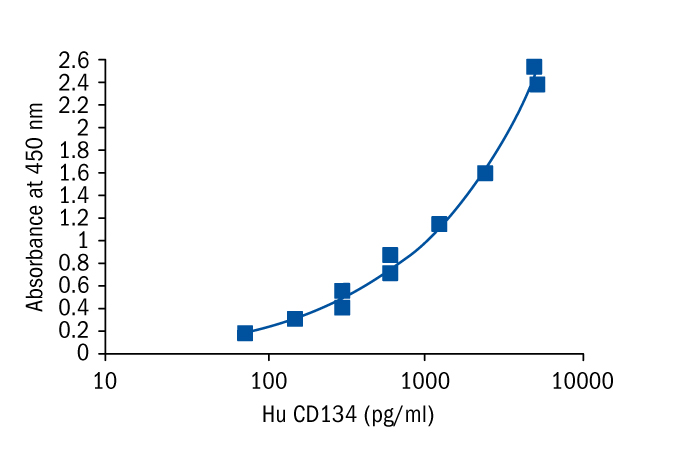Type
Sandwich ELISA, Biotin-labelled antibody
Applications
Serum, Cell culture supernatant
Sample Requirements
25 µl/well
Shipping
At ambient temperature. Upon receipt, store the product at the temperature recommended below.
Storage/Expiration
Store the complete kit at 2–8°C. Under these conditions, the kit is stable until the expiration date (see label on the box).
Calibration Curve
Calibration Range
78–5000 pg/ml
Limit of Detection
1.8 pg/ml
Intra-assay (Within-Run)
CV = 8.0%
Inter-assay (Run-to-Run)
CV = 12.0%
Spiking Recovery
88,00%
Dilution Linearity
109,00%
Research topic
Cell surface proteins (sCD)
Summary
OX40 (CD134) is a member of the tumor necrosis (TNF) receptor superfamily and known to be an important costimulatory molecule expressed on activated T-cells. Interaction of OX40 with its ligand, OX40L, is thought to be important in T cell activation through T cell/antigen-presenting cell (APC) interaction. Ligation of OX40 induces clonal expansion and survival of CD4 cells during primary responses, and results in the accumulation of greater numbers of memory cells with time.
Further OX40 has been shown to be involved in the T cell adhesion to endothelium. Induction of CD134 by Interleukin-4 has been suggested, which thus acts in a TH-2 type cytokine environment. OX40 expression is found besides T cells in a small subpopulation of macrophages, in Langerhans cells, and in B-cells in non Hodgkin’s lymphoma. OX40 promotes Bcl-xL and Bcl-2 expression thus being a critical regulator of antigen-driven T cell survival. OX40 signaling renders adult T cell leukemia cells resistant to Fas-induced apoptosis.
It has been described as a molecule involved in regulating immunological tolerance, which represents a major obstacle in developing effective immunotherapy against tumors.
A soluble isoform of OX40 has been described. Measurement of this molecule may have diagnostic value in polymyositis and granulomatous myopathy, in T cell lymphoma and lymphomatoid papulosis, in proliferative lupus nephritis, in rheumatoid arthritis, in HIV infection, in viral infections of the lung, in the regulation of graft-versus-host disease, in myocarditis and dilated cardiomyopathy. The crucial role of OX40 in development of autoimmune diseases has further been shown.
Find documents for the lot
Example Instructions for Use (RUO)
Example Instructions for Use (RUO)
Safety Information (RUO)
MSDS (RUO)

